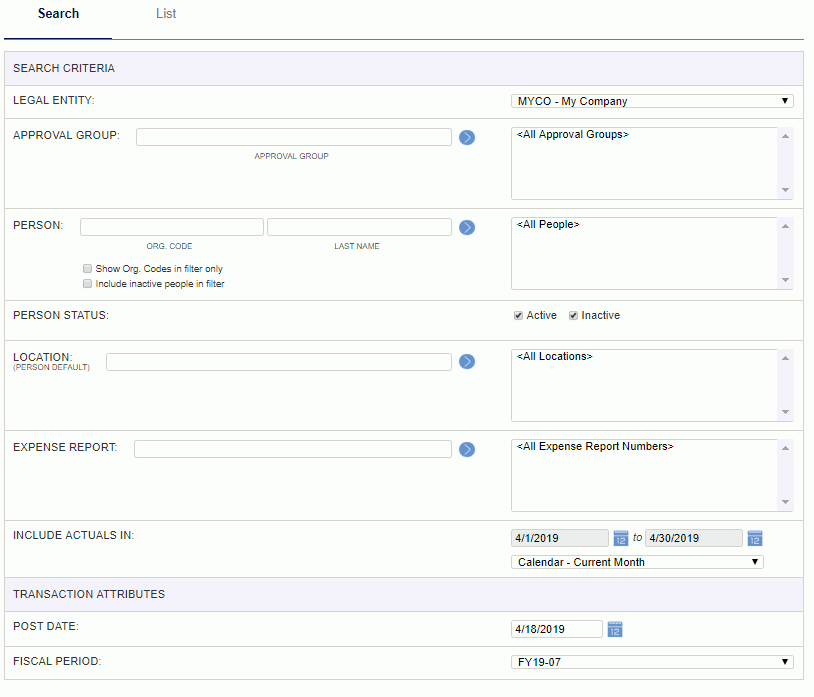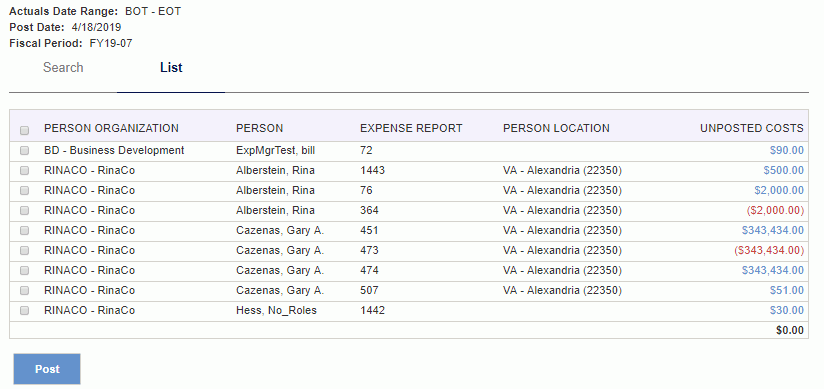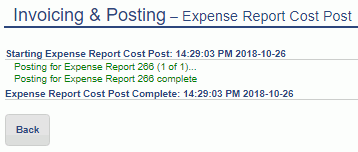Invoice & Posting - Expense Report Cost Post
Overview
The Expense Report Cost Post process provides a means to create journal transactions for costs related to expense report entries using a process similar to the Billing & Revenue – Post process. The process will only pick up expense reports meeting the search criteria (and other conditions) that have yet to be posted. Once posted, the expense report entries will be stamped to indicate they have been included in a post process. Depending on the Post to General Ledger (unanet.financials.post_to_gl) and Post to General Ledger Effective Date (unanet.financials.post_to_gl.eff_date) properties, the transactions can also optionally be posted to the General Ledger.
Using this feature allows you to capitalize on the robust Posting Group capabilities to manage the accounts associated with various transaction types. Further, using this feature allows you to better control which period transactions are to be associated with transactions (for improved cost reporting). It also allows for 'freezing' the accounts and periods with which transactions are associated. Many of the cost reports allow for reporting on posted data only, and thus this feature can also improve your ability to reconcile data with external systems.
Roles
This screen is available to users having any of the following roles: Administrator, P&R Administrator or GL Admin.
License
This screen is available with the Project Tracking and Project Portfolio family of Unanet licenses.
Topics covered on this help page include:
You may also be interested in:
Search
Using the Expense Report Cost Post Search screen, you can refine the list of users expense report entries to be included in an expense report cost post process. In addition to providing selection criteria to narrow down the list of users expense report entries to be included, you will also need to specify the Transaction Attributes (i.e., Post Date and Fiscal Period) to be used during the posting process.

Field Descriptions (click on a link below for additional information):
List
The values displayed in the resulting list are limited to those actuals meeting the following conditions:
- Only users matching the search criteria will be considered.
- Only amounts from expense reports in the LOCKED or EXTRACTED status will be considered.
- Only expense report actuals yet to be posted will be considered.
- Only actuals charged to projects with Owning Orgs belonging to the selected Legal Entity (which could be a subset of an expense report due to subcontractors charging to multiple Legal Entities on a single expense report).
- Only actuals falling within the specified date range (using either Line Item Date, Expense Report Completion Date or Post Date depending on the configuration setting in the Admin >> Setup >> Accounting >> Posting Options (Expense Report Posting) fields).
From this screen, the user can check one or many of the available check boxes and click on the Post button to invoke an Expense Report Cost Post for these amounts.

The Post button will only appear if the list contains at least one user having data eligible to be posted.
Field Descriptions (click on a link below for additional information):
Post Process
The Post process will create journal entries at the expense report allocated line item detail level. Optionally, general ledger entries will also be generated at a level determined by property settings. GL entries can be posted at summary or detail level. If posting at detail level, every cost post entry will have a corresponding GL entry. If posting at summary level, there will be one summary GL entry for each project for COST entries and one summary GL entry for each account - org combination for offset entries.
Project Prerequisites
General Rules for Posting Organizations and Accounts
- Rules for deriving posting organizations and accounts will come from the posting group associated with the project being processed.
-
- Posting group rules for any category not overridden by the project specific posting group will come from the system default posting group.
- All posted items will attempt to derive their posting organization regardless of whether or not Use Financial Organizations (unanet.financials.use_financial_orgs) is enabled.
-
- If financial organizations are not required:
- an item can be posted without a posting organization.
- if financial organizations are required:
- failure to find a posting organization for any item being posted will result in an error and the entire post being abandoned
- failure to find a posting organization that is a financial organization for any item being posted will result in an error and the entire post being abandoned
- if the derived posting organization is a financial organization that does not belong to the same legal entity as the owning organization of the project being processed the following *invalid legal entity error logic will apply":
- The posting organization will be derived using the posting group rules for the INVALID LEGAL ENTITY ERROR - EXPENSE REPORT COST POST account category.
- The account will be derived using the posting group rules for the INVALID LEGAL ENTITY ERROR - EXPENSE REPORT COST POST account category.
- The item will be posted using the originally intended account category, but using the organization and account derived via the error process.
- failure to find a valid organization or account via the invalid legal entity error logic will result in an error and the entire post being abandoned.
- All posted items will derive their posting account
-
- Failure to derive an account will result in an error and the entire post being abandoned.
Note: See Intercompany Support section for Multi-Entity posting.
General Rules for Posting
- GL entries are only generated when posting to the General Ledger (i.e., Post to General Ledger (unanet.financials.post_to_gl) property enabled and the Post to General Ledger Effective Date (unanet.financials.post_to_gl.eff_date) on or after the document post date.
- All transactions posted to the general ledger will have the following additional rules applied to the posting organizations and accounts:
-
- The account must allow transaction entry as of the post date
- The organization must be valid for the account
- The organization must allow transaction entry as of the post date
- Attributes for the general ledger entry will include (for the individual entries, those attributes that are different than the general entry will be noted):
-
- Feature - EXPENSE REPORT COST POST
- Document Number - Current document's document number
- Post Date - Current document's post date
- Fiscal Month - Fiscal month containing post date of current document
- Account - Described below
- Organization - Described below
- Project - Project associated with the entry
- Description - Described below
- Transaction Date - Post Date for this Expense Report Cost Post
- The value in Expense Report Posting (on the Admin > Setup > Accounting > Posting Options screen) is used to determine the date to apply the date range criteria to.
- The amount being posted is the allocated expense line item cost amount (or the sum of these amounts when posting a summary entry).
- Only LOCKED/EXTRACTED expenses are considered for inclusion in this process.
The posting process includes the following (not necessarily generated in this order):
- Create Expense Report Cost Entries
- Account & Org
-
- The Org will be derived from the Posting Group values related to the expense report line item's project for the EXPENSE REPORT COST account category, based on Organization Source.
-
- Legal Entity - Default general ledger posting organization defined for the legal entity of the project's owning organization
- Project - Task's owning organization if available, otherwise project's owning organization
- Person
- If requiring financial organizations
- If current person organization of expense report owner is a financial organization use it; otherwise Task's owning organization if available, otherwise project's owning organization
- If not requiring financial organizations current person organization of expense report owner
- The Accounts used in the posting are based on either the project type/expense type combination or the expense type from the expense report distribution.
-
- This process does not use defaulting logic based on the account category information from Posting Group.
- The expense account defaulting logic is as follows:
-
- If an account has been specified for the Project Type/Expense Type combination in Project Type setup, use that account
- If an account does not exist for the Project Type/Expense Type combination, use the Cost Account from the Expense Type
- If that also doesn’t exist, error.
- Note that the above defaulting logic is done as part of the Save process in the expense report and that the account is actually stored in the cost_account_key attribute in the expense_data_allocation table, so the posting process just needs to use the value stored there.
- If the cost_account_key is null, the posting process should attempt to re-default the account per the account defaulting logic above.
- Journal Post
-
- For each allocated expense line item
-
-
- General Ledger Post - If posting to the general ledger, post an entry for each journal transaction
-
-
-
-
- detail - generate a GL entry for each expense allocation entry posted.
- summary - summarize GL entries at the expense report/project/account/organization level.
- Expense Report Cost positive amounts are debits
- Expense Report Cost negative amounts are credits
- Create Expense Report Offset -- Reimbursable Entries
-
- Account & Org
-
- The Org and Account will be derived from the Posting Group values related to the expense report line item's project for the EXPENSE REPORT OFFSET REIMBURSABLE account category.
- If the user is not associated with a Financial Org, use the default post org for the Legal Entity for which this post is run when deriving posting group values.
- Journal Post
-
- For each allocated expense line item
-
- General Ledger Post - If posting to the general ledger, post an entry for each journal transaction
-
-
- detail - generate a GL entry for each expense allocation entry posted.
- summary - summarize GL entries at the expense report/account/organization level.
- Expense Report Offset Reimbursable positive amounts are credits
- Expense Report Offset Reimbursable negative amounts are debits
- Create Expense Report Offset -- Non-Reimbursable Entries
-
- Account & Org
-
- The Org and Account will be derived from the Posting Group values related to the expense report line item's project for the EXPENSE REPORT OFFSET NON-REIMBURSABLE account category.
- If the user is not associated with a Financial Org, use the default post org for the Legal Entity for which this post is run when deriving posting group values.
- Journal Post
-
- For each allocated expense line item
-
- General Ledger Post - If posting to the general ledger, post an entry for each journal transaction
-
-
- detail - generate a GL entry for each expense allocation entry posted.
- summary - summarize GL entries at the expense report/account/organization level.
- Expense Report Offset Non-Reimbursable positive amounts are credits
- Expense Report Offset Non-Reimbursable negative amounts are debits
Closed Fiscal Years
Posting to Closed Fiscal Year
When posting to or voiding a document from a closed fiscal year, and the document contains details for accounts having account types REVENUE and EXPENSE, where the credits and debits do not cancel each other out (i.e. the delta between the revenues and expenses is not = 0), this process will additionally need to generate an adjustment to the previously recorded RETAINED EARNINGS account for the closed year.
Note the adjustment will be generated regardless of the existence of the RETAINED EARNINGS account for the year being adjusted.
The adjusting transaction will have the following attributes:
- Feature - GL Closing
- Document Number - Document number of the document that caused the adjustment
- Post Date - The last day of the fiscal year being adjusted
- Fiscal Month - Fiscal month containing post date of the adjusting document
- Reference - Posting feature of the document that caused the adjustment
- Account - Derived based on the RETAINED EARNINGS category entry in the System Default Posting Group
- Organization - Derived based on the RETAINED EARNINGS account category entry in the System Default Posting Group
- Description - Fiscal Year {adjusted fiscal year value} Closing Entry
- Transaction Date - The last day of the fiscal year being adjusted
- Credit & Debit - As calculated based on the delta between the revenues and expenses included in the document that caused the adjustment. Positive delta should be recorded as a credit, and negative amount as a debit.
Post Process - Feedback
Once the post is run, the user will see feedback written to the screen that will indicate the expense reports included in the post. Should any unexpected issues be encountered, additional details will be written to the screen for the effected expense reports. Note that any expense reports that encounters an error during the post, would result in no items being posted. Other expense reports within that same run that did not encounter issue would have their data posted.

Person Expense Report Details Popup Reports
Clicking on the values in the Unposted Costs column will display a popup report showing a version of the Person Expense Details report (limited to details that support the displayed value). If multi-entity accounting is enabled, you will also see intercompany line items in this report, if applicable.
The popup report will resemble the following:

The dates involved in these comparisons are defined by the Unanet Administrator on the Admin >> Setup >> Accounting >> Posting Options (Expense Report Posting) screen.
Intercompany Support (Multi-Entity)
If your system has multi-entity accounting enabled (see Setup Multi-Entity), then intercompany expenses will be available for posting. When lending organization administrators run the expense report cost post, the process will use the cost structure defined on the intercompany balancing project for the multi-entity association between the lending and borrowing legal entities (see Setup Multi-Entity Association).
For intercompany expense entries, the intercompany balancing project is used for the posting group.
-
The following legal entities will be used, depending on the Posting Group Expense Report Cost account category:
-
if Project is selected as Organization Source, legal entity is borrowing project's Owning Organization
-
if Legal Entity is selected as Organization Source, legal entity is borrowing project's Legal Entity
-
if Person is selected as Organization Source, legal entity is the Person's Organization
-
The same logic applies for the offset (credit) account of either Expense Report Offset - Reimbursable or Expense Report Offset - Non-Reimbursable.
-
Following is an example:
Lender: LenderCo
Lender Balancing Project: LenderCoBalanceProj
Loaned Resource: Tricia
Borrower Project: ProjectA
-
Tricia submits $1,000 of reimbursable Airfare to Project A. This is the true cost of the expense and not intercompany cost that may be subject to a markup, depending on settings.
-
The posting created by this example on LenderCo's books will be:
-
DEBIT Expense report cost 1,000
CREDIT Expense report cost offset - reimbursable 1,000
-
Account derivation using Posting Groups:
-
For the DEBIT, Account Category is "Expense Report Cost".
-
For the CREDIT, Account Category is "Expense Report Cost Offset - Reimbursable" or "Expense Report Cost Offset - Non-Reimbursable" depending on if the expense is reimbursable or not.
-
The following legal entities will be used:
-
if Organization Source = Legal Entity, then LenderCoBalanceProj's (Lender balancing project) Legal Entity is the organization
-
If Organization Source = Project, then LenderCoBalancingProj's (Lender balancing project) Owning Organization is the organization
-
If Organization Source = Person, then Tricia's Person Organization is the organization
Note: The debits and credits are for positive amounts. For negative amounts, the debits and credits are reversed.
-



